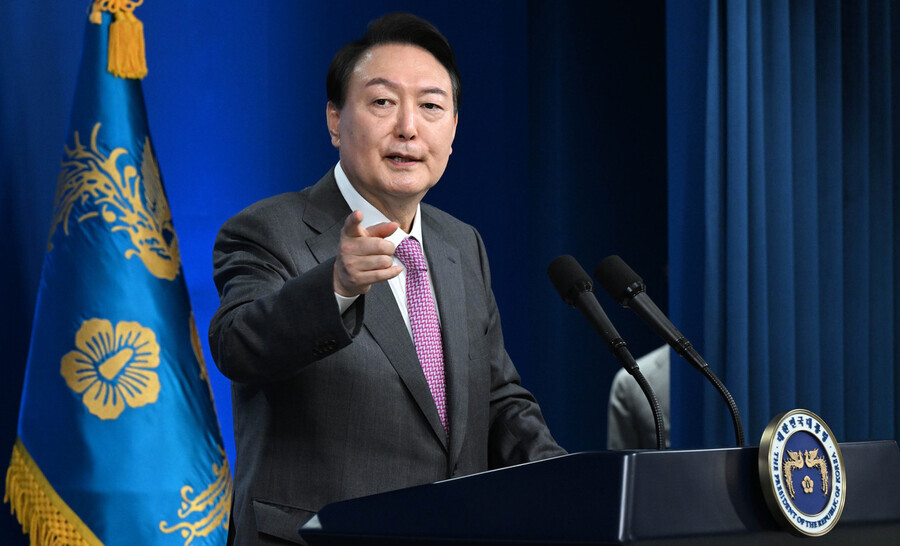hankyoreh
Links to other country sites 다른 나라 사이트 링크
Yoon tacks on conventional arms reduction talks to plan for N. Korean denuclearization

In remarks on Wednesday, South Korean President Yoon Suk-yeol mentioned that diplomatic and arms reduction discussions would be part of the comprehensive initiative for North Korea he had unveiled in his Liberation Day speech one day prior.
Coming on the heels of an announcement of six economic cooperation projects — support for food, agricultural technology, healthcare and infrastructure as well as financial and international investment — as part of an “audacious initiative” first proposed to Pyongyang in Yoon’s Liberation Day address on Monday, his latest remarks at a press conference marking his 100th day in office included two new political and military initiatives, namely “diplomatic support for normalizing North Korea-US relations” and “discussions on conventional weapon system reductions.”
But while Yoon spoke of those two new approaches as bold political and military initiatives in his press conference Wednesday, he did not provide any concrete explanation on how he would achieve them.
The discussions on conventional weapon system reductions in particular would correspond to “structural disarmament,” which represents the second stage of arms reductions. But in his press conference that day, Yoon made no mention of the military agreement of Sept. 19, 2018, which South and North Korea had agreed to and implemented at a rudimentary level as the first stage of arms reductions, namely “operational disarmament.”
In terms of diplomatic support for normalizing North Korea-US relations, Yoon did not share any ideas for transitioning from an armistice system to a permanent peace regime on the Korean Peninsula. It is a matter that will require further explanation.
When asked whether he intended to take the first step in proposing dialogue with Pyongyang on his initiative, Yoon answered, “We shouldn’t have dialogue between the South and North Korean leaders or among major working-level officials turning into a political show.”
His remarks seemed to suggest that he has no immediate plans to propose talks and that he intends to wait and see Pyongyang’s response to his initiative.
Commenting on his initiative, Yoon said, “It doesn’t mean that North Korea has to completely denuclearize first before we will do anything.”
“It means that if [North Korea] merely shows its intent [to denuclearize], we are willing to help accordingly with the things that we are able to do,” he stressed.
He also remarked that neither he nor his administration had any desire for an “excessive change to the status quo for North Korea, or one achieved through force.”
While they did not reach the level of the overt declarations by former Presidents Kim Dae-jung, Roh Moo-hyun, and Moon Jae-in that Seoul would “not pursue unification by absorption” of North Korea, Yoon’s remarks were his first public message signaling that he does not intend to unify with North Korea in such a way.
When asked for his thoughts on arguments that South Korea should arm itself with nuclear weapons, Yoon responded that the Non-Proliferation Treaty (NPT) system is an “essential prerequisite for permanent world peace.”
“I intend to uphold the NPT system to the end,” he stressed, signaling that he has no plans for South Korea to develop its own nuclear weapons.
At the same time, he added that he views it as a priority to “establish stronger and more effective extended deterrence.”
Commenting on a possible resolution to the forced labor mobilization issue at the heart of the current impasse in relations with Tokyo, Yoon said he was “carefully exploring ways for creditors to be compensated without provoking the clash over sovereignty that Japan is worried about.” This suggested that he is ruling out compulsory execution of the court ruling as a solution.
By Lee Je-hun, senior staff writer
Please direct questions or comments to [english@hani.co.kr]

Editorial・opinion
![[Column] Park Geun-hye déjà vu in Yoon Suk-yeol [Column] Park Geun-hye déjà vu in Yoon Suk-yeol](https://flexible.img.hani.co.kr/flexible/normal/500/300/imgdb/original/2024/0424/651713945113788.jpg) [Column] Park Geun-hye déjà vu in Yoon Suk-yeol
[Column] Park Geun-hye déjà vu in Yoon Suk-yeol![[Editorial] New weight of N. Korea’s nuclear threats makes dialogue all the more urgent [Editorial] New weight of N. Korea’s nuclear threats makes dialogue all the more urgent](https://flexible.img.hani.co.kr/flexible/normal/500/300/imgdb/original/2024/0424/7317139454662664.jpg) [Editorial] New weight of N. Korea’s nuclear threats makes dialogue all the more urgent
[Editorial] New weight of N. Korea’s nuclear threats makes dialogue all the more urgent- [Guest essay] The real reason Korea’s new right wants to dub Rhee a founding father
- [Column] ‘Choson’: Is it time we start referring to N. Korea in its own terms?
- [Editorial] Japan’s rewriting of history with Korea has gone too far
- [Column] The president’s questionable capacity for dialogue
- [Column] Are chaebol firms just pizza pies for families to divvy up as they please?
- [Column] Has Korea, too, crossed the Rubicon on China?
- [Correspondent’s column] In Japan’s alliance with US, echoes of its past alliances with UK
- [Editorial] Does Yoon think the Korean public is wrong?
Most viewed articles
- 1[Column] Park Geun-hye déjà vu in Yoon Suk-yeol
- 2N. Korean hackers breached 10 defense contractors in South for months, police say
- 3Will NewJeans end up collateral damage in internal feud at K-pop juggernaut Hybe?
- 4[Cine feature] A new shift in the Korean film investment and distribution market
- 5[Editorial] Japan’s rewriting of history with Korea has gone too far
- 6[Column] ‘Choson’: Is it time we start referring to N. Korea in its own terms?
- 7Kim Jong-un expressed ‘satisfaction’ with nuclear counterstrike drill directed at South
- 8[Editorial] New weight of N. Korea’s nuclear threats makes dialogue all the more urgent
- 9[Column] The clock is ticking for Korea’s first lady
- 10Senior doctors cut hours, prepare to resign as government refuses to scrap medical reform plan